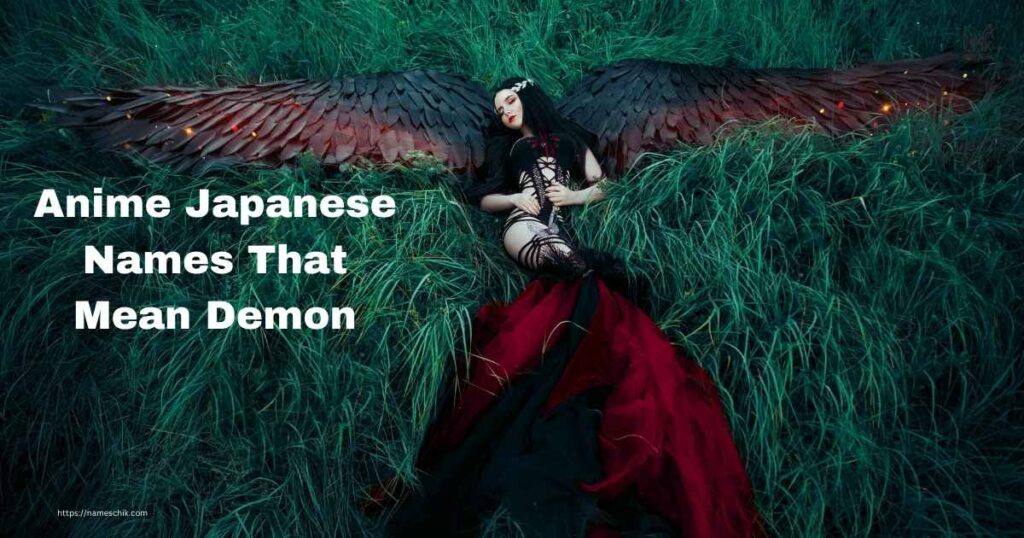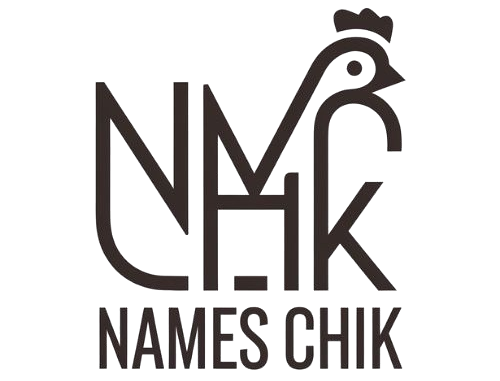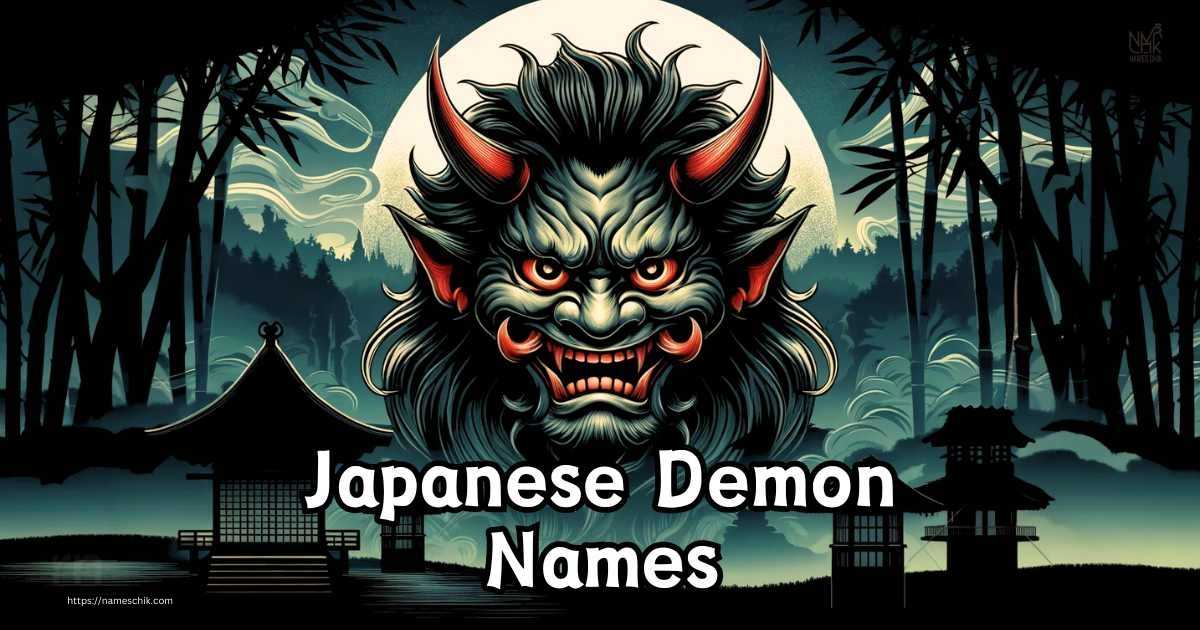If you’re fascinated by Japanese mythology and the dark side of names, you’re in the right place. In this article, we’ll explore “Japanese Names That Mean Demon.” These names are inspired by various aspects of Japanese folklore, where demons, or oni, play significant roles. Whether you’re looking for Japanese demon names male or evil Japanese names, you’ll find unique and intriguing options here.
So, what Japanese name means demon? There are many Japanese names that mean demon, each carrying its own story and symbolism. From fierce malevolent spirits to powerful mythical creatures, these Japanese names that mean demon are not only cool but also steeped in rich cultural meaning. We’ll dive into the meanings of these Japanese names that mean demon, uncovering their origins and the mysterious forces they represent. Get ready to explore a world of Japanese names that mean demon.
130 Japanese Names Meaning Demon
130 Japanese Names Meaning Demon explores the dark side of Japanese culture, with Japanese Names That Mean Demon drawing from powerful mythical creatures. From Japanese demon names male to evil Japanese names, these names evoke fear and strength.
If you’re wondering what Japanese name means demon, you’ll find many fascinating options. Whether you’re looking for a Japanese name that means demon, these Japanese names that mean demon are rich in mystery and meaning.
Best Japanese Names That Mean Demon
| Akuma | Oni | Mazoku |
| Tengu | Yurei | Gaki |
| Ryūjin | Hannya | Nurarihyon |
| Jorogumo | Kappa | Yamauba |
| Rōnin | Asura | Fūjin |
| Ikiryō | Kageoni | Jikininki |
| Dorotabō | Kurozawa | Hōō |
| Kuro | Ashura | Meiji |
| Tōfuku | Fukujū | Goryō |
| Yami | Ikiryo | Kamikiri |
| Tanuki | Aoni | Kage |
| Kurofuku | Shōkō | Ryūha |
| Ōkami | Furi | Yūmei |
| Jigoku | Sekai | Akai |
| Kisei | Ikiryo | Raijin |
| Kyūbi | Mōryō | Yuki-onna |
| Gōkō | Shisha | Yōjin |
| Kōbō | Zōn | Sōzu |
| Tengu | Rōshū | Kōjin |
| Ikiryo | Yōkai | Kōyō |
| Yami | Ashura | Kamikiri |
| Magu | Onibi | Ryūjin |
| Umi | Jōro | Rōnin |
| Hōjō | Yōjin | Akuma |
| Gōkai | Kōshin | Tōka |
| Kagekō | Namazu | Yurei |
| Taikai | Furi | Dorotabō |
| Kōjin | Genji | Goryō |
| Seiryu | Yamauba | Ikiryo |
| Sōra | Maken | Ryūjin |
| Kōbō | Kagami | Zōn |
| Kaiki | Ryūha | Ikiryo |
| Umi | Tōfuku | Tengu |
| Kyōkai | Yōmei | Daikokuten |
| Tokage | Hannya | Kamikiri |
| Kage | Gajin | Kōjin |
| Akibara | Yōkai | Ashura |
| Asura | Kōyō | Jikininki |
| Kurozuma | Yami | Kageoni |
| Ryūjin | Goryō | Ōkami |
Mythological Japanese Names That Mean Demon
- Tōkijin
- Oniwaka
- Jūō
- Rokurokubi
- Gaki
- Yurei
- Mizuchi
- Kurozuka
- Aka-oni
- Futakuchi-onna
- Yokai
- Ibaraki-doji
- Tengu
- Tōnari-no-oni
- Umi-bōzu
- Kaidan
- Kuro-kami
- Zashiki-warashi
- Yōkai
- Kappa
- Kagirohi
- Nurarihyon
- Fukujū
- Kōjin
- Yamabiko
- Hōjō
- Meiji
- Tōfuku
- Omoikane
- Jorogumo
- Raijin
- Inugami
- Hōō
- Mōryō
- Mikoshi
Anime Japanese Names That Mean Demon

Akaoni: Meaning “red demon,” often used to describe powerful and wrathful demons in anime like Monogatari Series.
Tsuchigumo: A spider demon, often depicted as a creature of malice and trickery, seen in anime like InuYasha.
Kirin: A mythical creature resembling a dragon, sometimes associated with spiritual guardians or demonic forces in anime like Fate/stay night.
Yokai: Meaning “supernatural creature” or “demon,” a broad term for various mythical beings in anime like Monogatari Series.
Kurokami: Meaning “black hair,” often associated with dark spirits or demonic entities in anime like Naruto.
Urami: Meaning “grudge,” referring to spirits or demons fueled by vengeance, seen in anime like Natsume’s Book of Friends.
Yasha: A demon-like entity, sometimes linked to the underworld or monstrous beings in anime like Naruto.
Jigoku: Meaning “hell,” often used to describe the domain of demons or the afterlife in anime like Demon Slayer.
Kuroshio: Meaning “black tide,” symbolizing a dark and consuming force in anime like Bleach.
Yamabiko: A mountain demon or spirit that mimics sounds, often depicted as mischievous or ominous in anime like Natsume’s Book of Friends.
Kurotama: Meaning “black jewel,” associated with a demonic or cursed artifact in anime like Fullmetal Alchemist.
Rokurokubi: A yokai demon known for stretching its neck, featured in anime like Monogatari Series.
Ibaraki: A demon from Japanese folklore, often shown as a fearsome and powerful entity, as in Monogatari Series.
Kama Itachi: A weasel demon, associated with swift, cutting winds, featured in anime like Naruto.
Kitsune: A fox spirit with both good and evil connotations, often portrayed as a trickster in anime like Spice and Wolf.
Inugami: A dog spirit, sometimes portrayed as a demon, as seen in anime like Monogatari Series.
Tsuchinoko: A legendary snake-like creature, often depicted as a mysterious being with magical or demonic qualities in anime like Naruto.
Miko: A spiritual medium, sometimes possessed by spirits or demons in anime like Monogatari Series.
Hobgoblin: A small, mischievous demon, often found in supernatural anime like InuYasha.
Tengu: A bird-like demon with powerful abilities, sometimes considered a protector or a trickster, seen in anime like Naruto.
Oniwaka: A demon child, often portrayed with extraordinary strength, appearing in anime like Naruto.
Kurofuku: Meaning “black clothing,” associated with demons or spirits that appear as dark figures in anime like Demon Slayer.
Kamigami: Meaning “gods,” sometimes referring to demonic deities or spirits in anime like Naruto.
Noppera-bō: A faceless ghost, often linked to eerie or demonic forces in anime like Monogatari Series.
Mujina: A badger spirit with shapeshifting abilities, sometimes used to represent trickster demons in anime like Naruto.
Ryuusei: Meaning “meteor,” symbolizing a powerful force of nature often tied to destructive or demonic beings in anime like Fate/stay night.
Orochi: A mythical serpent demon with multiple heads, commonly associated with destruction, appearing in anime like Naruto.
Akahebi: Meaning “red snake,” symbolizing danger and malevolent spirits in anime like Monogatari Series.
Raikou: Meaning “thunder,” often associated with demonic powers or lightning-wielding demons in anime like Naruto.
Goribami: Meaning “heavy tree,” a demon-like entity associated with nature and the underworld, featured in anime like Fate/stay night.
Yurifuyu: A demon of winter, often associated with chilling powers and malevolent forces in anime like Natsume’s Book of Friends.
Hō-ō: A mythical phoenix demon, known for resurrection and mystical powers, seen in anime like Naruto.
Akashita: Meaning “red demon,” a name often used for evil spirits or demonic entities in anime like InuYasha.
Gama: Meaning “toad,” a demonic or spiritual being associated with poison or magic, as seen in anime like Naruto.
Hagoromo: Meaning “celestial robe,” linked to divine and demonic entities, often seen in anime like Naruto.
Yamabiko: A mountain spirit that can manipulate sound, sometimes with supernatural powers linked to demons in anime like Natsume’s Book of Friends.
Mikoshi: A portable shrine spirit, sometimes possessing a demonic essence, as depicted in anime like Noragami.
Goryō: A malevolent spirit of the dead, seeking vengeance, often shown in anime like Natsume’s Book of Friends.
Rokuro: A character associated with dark spirits or demonic forces, appearing in anime like Monogatari Series.
Akaoka: Meaning “red hill,” a demon name tied to a sense of foreboding and darkness, featured in Fate/stay night.
Kuroi: Meaning “black,” symbolizing darkness and evil, often linked to demonic figures in anime like Demon Slayer.
Mitsukuri: Meaning “demon’s creation,” referring to a demon that was brought into existence, seen in Naruto.
Mekura: Meaning “blind,” representing a demon who feeds on the fear or weakness of others in anime like Monogatari Series.
Tachikawa: A name connected to spirits or demons from the underworld, appearing in anime like Naruto.
Fujin: Meaning “wind god,” a demon-like deity controlling storms and winds, commonly featured in anime like Naruto.
Game Japanese Names That Mean Demon
- Yūrei
- Tōkijin
- Goryō
- Kurokami
- Aka-oni
- Yamabiko
- Inugami
- Rokurokubi
- Mizuchi
- Kurozuka
- Uroko
- Kamigari
- Shōkō
- Hōō
- Tōnari-no-oni
- Kaidan
- Fūkō
- Futakuchi-onna
- Jūō
- Ibaraki-doji
- Jorogumo
- Seiryu
- Akuro
- Kage
- Yōjin
- Zashiki-warashi
- Mōryō
- Shōjō
- Onryō
- Yōkai
- Raiju
- Kitsunebi
- Aka-Manto
- Mikoshi
- Kuchisake-onna
Read More: Famous DND Names for Druid
Fierce Japanese Names That Mean Demon
- Gaki
- Oniwaka
- Daidara
- Kurogami
- Raijin
- Yurei
- Kurotsuki
- Oniyama
- Urami
- Jigoku
- Kurokami
- Akaoni
- Kintaro
- Kurozumi
- Tenshi
- Yamabura
- Rokuon
- Hō-ō
- Mujina
- Akahebi
- Tengu
- Ikiryo
- Goryō
- Bakeneko
- Mikoshi
- Fujin
- Kamigami
- Akahebi
- Raikou
- Yasha
- Inugami
- Jorogumo
- Onikage
- Tsuchinoko
- Yamabiko
Rare Japanese Demon Names and Their Meanings
Fujin: The wind god demon, capable of bringing massive destruction through storms.
Tsuchinoko: A rare snake-like demon that can elude capture and possess dark powers.
Ryuusei: A meteor demon, often representing an unstoppable destructive force from the heavens.
Oniwaka: A rare and powerful young demon, often associated with great strength.
Kirin: A mythical creature that’s demon-like in its powers and control over natural forces.
Jorogumo: A spider demon, known for its deadly traps and deceptive nature.
Goryō: A vengeful spirit or demon, often rising from the dead to avenge its wrongs.
Mujina: A shapeshifting demon, known for its trickery and ability to deceive humans.
Kamigami: Meaning “gods,” sometimes used for demon-like spirits in the Shinto pantheon.
Tengu: A rare bird demon, often associated with martial arts and supernatural abilities.
Kurotama: Meaning “black jewel,” a demon name linked to cursed artifacts.
Akashita: A red demon, associated with intense heat and destructive passions.
Inugami: A dog spirit demon, sometimes used for dark rituals or curses.
Kurokami: Meaning “black hair,” symbolizing demonic energy that lurks beneath the surface.
Tengu: A rare and powerful bird demon, sometimes seen as an agent of chaos.
Oni: A classic demon name, representing an ancient and powerful force of destruction.
Yamabiko: A rare mountain spirit demon with the power to mimic sounds and mislead travelers.
Yokai: A broad term for supernatural spirits, many of which are rare and malevolent.
Kitsune: A fox spirit, often demonic in its trickery and manipulation.
Rokurokubi: A rare demon with supernatural abilities, often used in folklore as a warning.
Hō-ō: A mythical, phoenix-like demon that represents death and rebirth.
Ryuuto: A rare, dragon-like demon, symbolizing power and elemental strength.
Mikoshi: A spirit or demon tied to Shinto shrines, representing powerful energies.
Tsuchigumo: A demon spider, rare in its deceptive and violent nature.
Jigoku: Meaning “hell,” a realm where rare demons and spirits reside.
Akahebi: A rare snake demon, known for its fiery and toxic venom.
Kuroshio: A name that can symbolize a rare demon tied to destructive oceanic forces.
Ibaraki: A fierce demon known for its immense strength and fearsome nature.
Yasha: A rare demon spirit, often tied to the forces of death and the afterlife.
Kirin: A rare mythical creature often associated with power and untamable forces.
Rokuro: A demon name connected to shadowy, rare forces in the spiritual world.
Fujin: A wind god demon, rare in its ability to summon and control violent storms.
Tachikawa: A rare name for a demon, often associated with the underworld and dark rituals.
Mujina: A trickster demon, rare in its abilities to shapeshift and deceive the living.
Akaoni: A red demon with rare powers, representing fire, rage, and wrath.
FAQ’s
What is a Japanese name that means demon?
Japanese Names That Mean Demon are inspired by powerful mythical creatures. They reflect the dark side of Japanese folklore.
What is a scary demon in Japanese?
A scary demon in Japanese folklore is often referred to as oni. These demons are fierce and symbolic of evil forces, making them prominent in Japanese Names That Mean Demon.
What is the Japanese name for a nightmare?
In Japanese, nightmares are sometimes linked to dark spirits. A Japanese names that mean demon could be associated with these haunting entities.
What name means ghost in Japanese?
The name yūrei refers to a ghost in Japanese. It embodies the spirit of the deceased and is linked to Japanese Names That Mean Demon.
What do you call a Japanese demon?
A Japanese demon is often called an oni. These demons are known for their terrifying appearance and power in Japanese Names That Mean Demon.
Conclusion
In conclusion, Japanese Names That Mean Demon offer a fascinating glimpse into the darker side of Japanese culture and mythology. These names are often tied to powerful and mysterious beings, representing a wide range of spirits and demons. If you’re looking for Japanese demon names male or evil Japanese names, there are plenty of options that evoke strength, fear, and awe. The Japanese names that mean demon can be a striking choice for those seeking something unique and meaningful.
So, if you ever wondered what Japanese name means demon, now you know there are several choices that reflect the deep cultural significance of these creatures. From Japanese names that mean demon to Japanese name that means demon, each carries its own story and power. These Japanese names that mean demon are perfect for those interested in exploring the world of demons in Japanese folklore, offering a blend of myth, mystery, and meaning.

